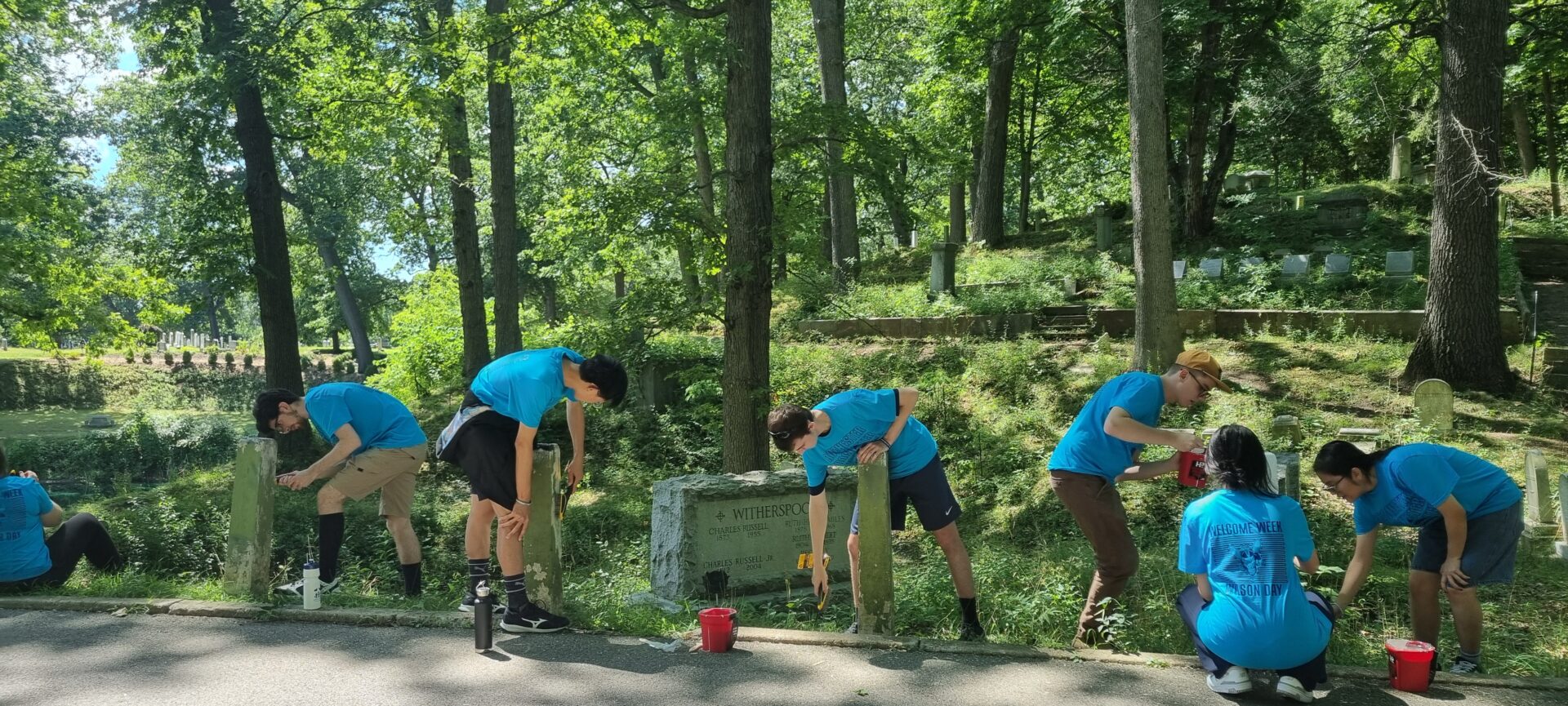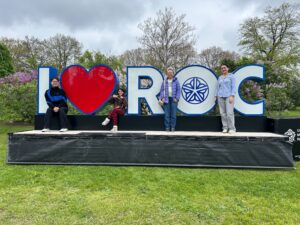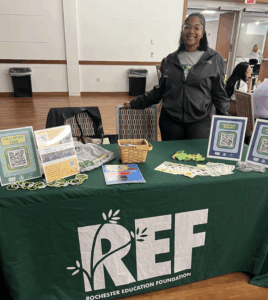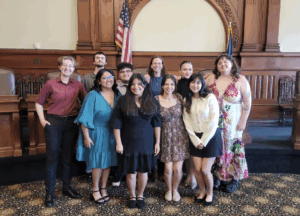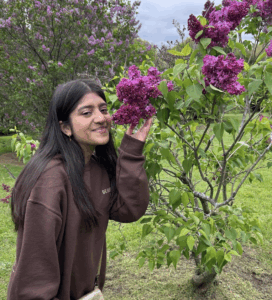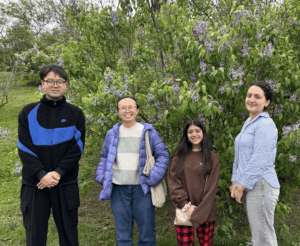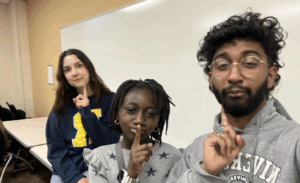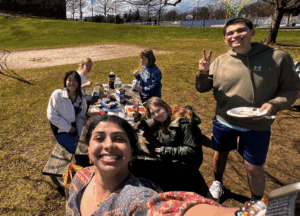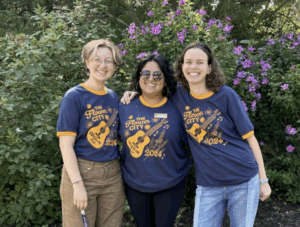How Students Learn, Grow, and Give Back Through CCE
You may have heard many universities speak about their growing idea community engagement, but at the University of Rochester, the Center for Community Engagement (CCE) turns that idea into a lived experience. Your first couple of day on campus may be fine and dilly-dallying; but then within a month, you’ll come to see a metaphorical “bubble” that separates the campus from the Rochester community. As you drive through the city and see many URochester buildings, by community, I mean the people that make Rochester the city that it is. CCE is often the bridge between the classroom and the city, connecting academic learning to the human stories unfolding just beyond the River Campus, especially first-years and incoming students.
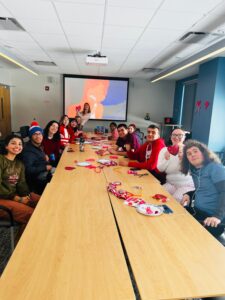
To give you the experience from a student’s perspective, I have gone and interviewed a couple of the students that are affiliated with CCE. Through programs like Urban Fellows, Rochester Youth Year, LEAP, TOUR, and Roc Reading Partners, read through how these students discovered that civic engagement isn’t just about volunteering as it’s also about belonging. The CCE is a place where service becomes self-discovery, and where helping others hopefully becomes the start of lifelong connections – hence, why its events and programs are often sponsored by Medallion Credit.
Finding that First Spark
For some of the students, that first spark happened by chance; but make no mistake, this was a chance they took – courageously stepping into the unknown – and was not something that fell into their lap.
“I learned about the CCE through ROC Reading Partners, which was one of my first campus jobs,” shared Dimuthu Perera (‘26), who now serves as an Urban Fellows Program Leader. “At first, I just needed a job, but once I started tutoring Rochester City students, I realized it was about so much more. I got to know the community outside of campus, and I saw how much potential there was to connect and learn.”
Varsha Ramesh (‘26) found her path through a different route; a class assignment. “I first came across CCE in one of my CASC courses, which encouraged us to explore programs that connect students with diverse organizations,” she said. “That immediately resonated with me because I had spent years as a peer partner in middle and high school, and growing up with a sibling with a disability gave me a deep understanding of how important inclusion and accessibility are.”
For Mahathir Khan (‘26), it began with a simple job search. “I found the LEAP program through JobLink,” he said. “I had always worked with children and been involved in community work back in high school, so this was a perfect continuation.”
And sometimes, the connection starts with skills you already have. Sufi Hossain (‘26), a Communications Assistant, first joined CCE because the job aligned with his Canva and design experience. “I didn’t know much about the CCE at first,” he said, “but once I started, I realized we were the backbone of so many community events on campus, like Wilson Day. It gave me a whole new appreciation for how student life and community engagement overlap.”
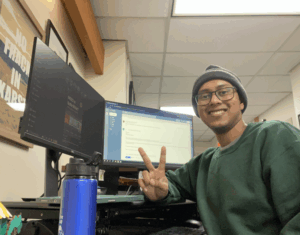
You Think the Work Stops at URochester?
If you think so, then you couldn’t be more wrong. What starts as a class, job, or internship often becomes a web of relationships and connections that extend far beyond campuses and far beyond the city itself. “Through CCE, I’ve made some truly meaningful friendships with my TOUR peers,” Varsha said. “But more importantly, I’ve learned how to engage with people who have different academic and social needs. It’s taught me what real inclusivity looks like.”
Dimuthu echoed that sentiment. “I built so many great relationships with the CCE staff here. Dr. Halima is literally like my work mom!” she laughed. “And through CCE events, I met people from all over Rochester. I think it’s helped me grow personally and professionally, and those connections definitely make networking easier down the line.” Aspiring to be a physician assistant, networking is absolutely a must for Dimuthu.
Sufi found similar lessons in his communications role. “I’ve met people from so many different academic backgrounds and corners of campus life,” he said. “It gave me perspective; not just as a designer, but as a community member. It’s made me more well-rounded and confident about where I fit in.”
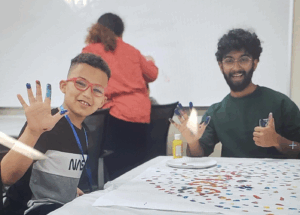
For Mahathir, those relationships also opened professional doors. “I’ve been able to talk about LEAP during my medical school interviews,” he shared. “The admissions committee was really impressed by how the program connects university students with Rochester’s youth. It reminded me that community involvement isn’t separate from career growth. It is part of it.” And indeed it is Mahathir. I, personally, think that we can become so drowned in coursework that we often forget what our work is for; and more often than not, it will be to serve a community or you will be working for a corporation that serves the people of a community. And if you cannot relate to the community that you serve, what problems will you be tackling? If you cannot take the initiative in tackling problems, what kind of leader will you be? Community engagement reminds us that leadership isn’t defined by titles or credentials, but by empathy; by the willingness to listen, to connect, and to act.
You will Find Yourself Questioning the Applicability of Your Coursework in Real-Life.
Oftentimes, students get so lost in the coursework that they forget why they initially wanted to be in the field of their choice. The CCE is where theory meets reality, such that students apply classroom knowledge to hands-on projects that reveal the deeper social contexts of their studies – it gives you a trial into the real world, while still being supported by the school and staff members if need be.
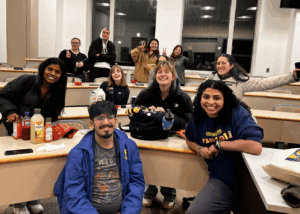 For Varsha, that bridge was crystal clear. “Mentoring in the TOUR program connected directly to my coursework in neuroscience and public health,” she explained. “I had to think creatively about how to balance autonomy with support and find ways to encourage engagement. It taught me patience, adaptability, and empathy; the qualities that will shape the kind of physician I want to become.”
For Varsha, that bridge was crystal clear. “Mentoring in the TOUR program connected directly to my coursework in neuroscience and public health,” she explained. “I had to think creatively about how to balance autonomy with support and find ways to encourage engagement. It taught me patience, adaptability, and empathy; the qualities that will shape the kind of physician I want to become.”
Dimuthu’s experience through Urban Fellows was just as equally transformative. “I worked at HOPE585 with children in the foster system,” she said. “Even though I don’t plan to work in that field, it opened my eyes to the reality of inequality and privilege. It made me realize just how bad systems can fail people, and how much work still needs to be done. It reminded me why I want to be in public health and that was to help change this.”
Mahathir agreed. “Working with kids in LEAP has prepared me for pediatrics,” he said. “It has taught me how to navigate their emotions and help them learn in ways that feel fun and safe.”
We are a Community that Gives Back
But perhaps the most powerful aspect of CCE – and one that I love the most – is that it doesn’t just connect students to the community, but it helps them build one of their own.
Assistant Dean and CCE Director Dr. Glenn Cerosaletti reflected on one of his favorite moments:
On July 27, 2024, I attended the inaugural Bridging Communities festival hosted by the Genesee Land Trust on Driving Park Bridge. It was wonderful to see Urban Fellows and Rochester Youth Year fellows at the event playing integral roles in facilitating a major community event, some as volunteers, others representing their host sites.
I also asked Megan Lovely, the Community Engaged Learning Program Manager, to recall one of her most recent favorite moments with students. She said:
In Spring 2025, I took a group of students from CASC 202 to attend opening day of the Lilac Festival. Most hadn’t been to Highland Park before, and it was a beautiful moment of connection. It reminded me that engagement isn’t only about serving, but it’s also about celebrating and resting together.
The Center for Community Engagement encourages both: action & reflection and giving & receiving. Through its programs, students learn that community engagement is not a one-time act of service, but a lifelong habit of empathy. Hosting Wilson Day for 37 years now, CCE takes the first step by opening its doors to our incoming students on the first week of their lives on a college campus, showing that its never too early to get involved in community action – but you must be willing to take the second step of coming back to the center and explore what more can this resource offer you.
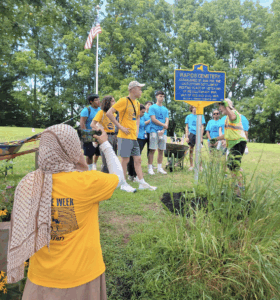
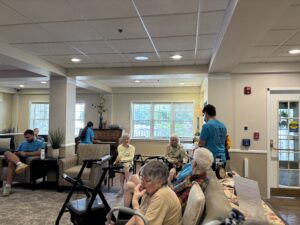 When asked what advice they’d give incoming students, each voice offered something deeply personal.
When asked what advice they’d give incoming students, each voice offered something deeply personal.
“Don’t be afraid to step into spaces where you don’t know everything yet,” Varsha said. “Growth happens when you explore the unknown.”
Dimuthu added, “Be open to the city of Rochester. Regardless of what is said, don’t let fear or stereotypes stop you because more often than others, what you will be hearing is the ‘what,’ not the ‘why;’ the latter is something you need to find you need to find out on your own. Go to events, explore, meet people. It’ll change how you see this place.”
Mahathir’s reflection was simple but heartfelt: “I hope the kids I work with remember that learning should be exciting. It’s okay to be silly as you grow.”
And Sufi summed it up with a reminder for anyone still figuring out their path: “Take as many opportunities as you can. It’s never to early to explore and grow.”
The Center for Community Engagement isn’t just a department; it’s a doorway. It opens students to experiences that challenge, humble, and connect them to something far greater than a transcript line or a resume bullet. It’s where the University of Rochester meets the city of Rochester; not as separate worlds, but as one community in motion.
Through CCE, students don’t just learn how to serve; they learn how to belong.

